
If you’re looking to get married on a budget, keep your wedding short and sweet, or you’re simply not interested in having a large or lavish wedding, a registry office wedding ceremony is a fantastic alternative to a traditional wedding ceremony.
But, what exactly happens at a registry office wedding ceremony? How much do they cost, how long are they and how do you organise one? There are a lot of questions about them and how they compare to other more traditional or religious ceremonies. You might not be sure whether they’re right for you.
If you’re looking to plan your own registry office wedding or figure out if one fits the vision you have for your big day, then this guide is for you. We’ll cover everything you need to know so you can plan a fabulous registry office ceremony. For more information, read our ultimate wedding ceremony guide for a detailed look at different types of wedding ceremonies.
What is a registry office wedding ceremony?
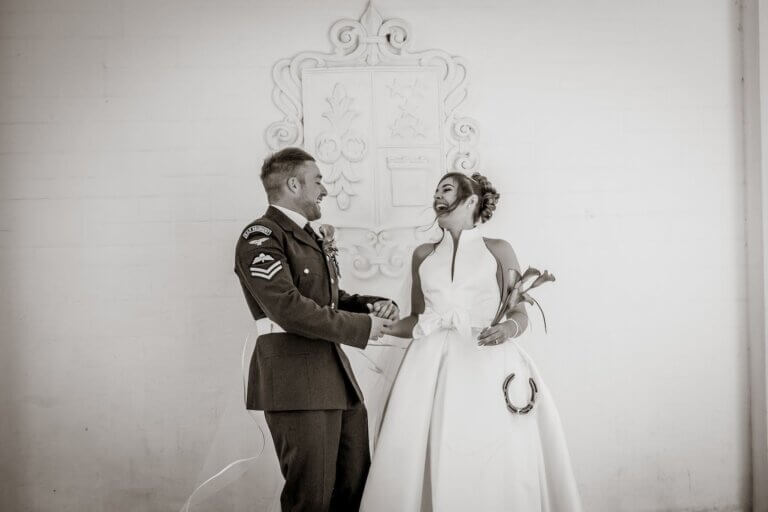
A registry office wedding is, as the name suggests, a wedding that takes place in a registry office. A registry office is a government building where every birth, death, adoption, civil partnership and marriage is registered in England, Wales and Northern Ireland.
Despite being a working office where many employees spend their days, there are rooms and spaces within the building that are specifically designed and decorated with weddings in mind. It may be an office by name, but registry office ceremonies take place in lovely surroundings. Many councils have registry offices located on their own premises, with dedicated grounds and gardens that are perfect for hosting a wedding. So, don’t be put off by hearing the words ‘office’ and ‘government building’. If you’re getting married on a budget or don’t want a large wedding, it’s worth visiting your local registry office to view the space and get a feel for what your ceremony could look like.
Registry office wedding ceremonies may be short and non-religious, but that doesn’t mean they’re not memorable or lack the magic and romance of other types of ceremonies. Most ceremonies will follow a similar structure, but you can still personalise them and make them your own.
How popular are registry office wedding ceremonies?
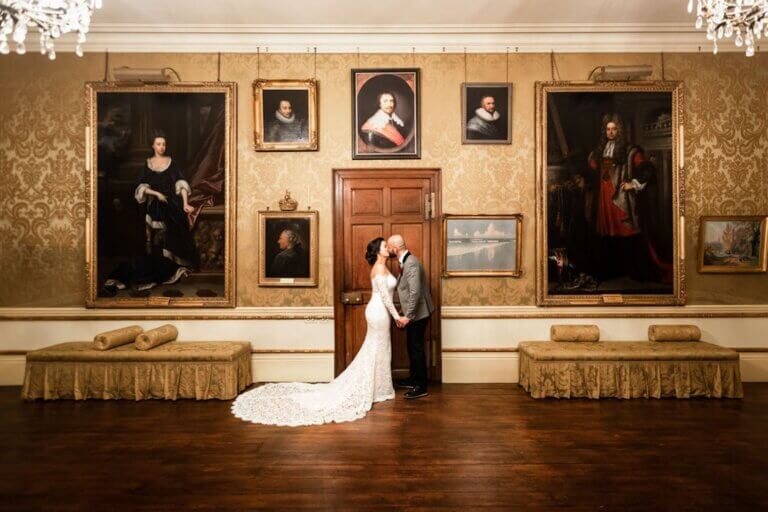
Our 2023 Wedding Report revealed that 2% of wedding ceremonies that took place in the UK last year were at a registry office. That means, with almost 400,000 weddings taking place a year in the UK, as many as 6,000 couples tied the knot at a registry office.
What type of couples usually choose a registry office wedding ceremony?

Because registry office wedding ceremonies can’t contain any references to God or religion, including hymns, readings or references in vows, they’re a common choice for couples with no religious beliefs or couples with mixed beliefs. If you have religious beliefs and would like there to be references to them in your wedding ceremony, you unfortunately can’t get married at a registry office. However, if you do have religious beliefs and you’re happy for there not to be religious elements to your ceremony, you’re of course more than welcome to get married at a registry office.
Because registry office weddings are short and inexpensive, they’re a popular choice for couples who have smaller budgets or don’t want the fuss associated with larger weddings.
Are registry office weddings expensive?
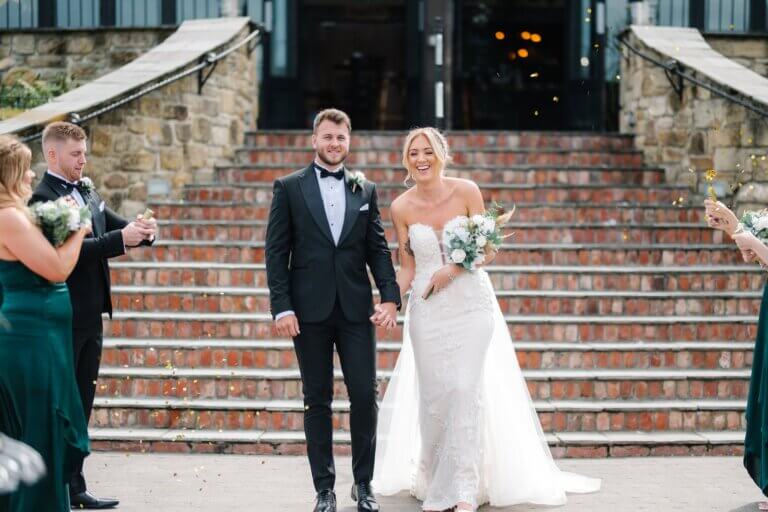
Our 2023 Wedding Report found that the average cost of a registry office wedding in the UK is £1,342, which makes it one of the most affordable ways to get married – especially when you consider the average overall cost of a wedding in the UK is a whopping £19,184. That means, if you’re excited to get married but only have a small budget, you can still have a beautiful and memorable ceremony.
Don’t forget, there are plenty of ways you can personalise a registry office wedding ceremony, which means this figure can go up or down. For example, the basic ceremony rate for a registry office wedding is around £57, or you may choose to get married in a ceremony room, which is a little bigger to allow for more guests, which will cost around £200. It can also be slightly more expensive to get married on a Saturday or Sunday than it can during the week.
Of course, it also depends on whether you choose to have a reception or breakfast after the wedding. The more you plan, the more expensive it’s going to be.
If you love the idea of a registry office wedding but are keen to keep costs low, read our guide on how to save money on a registry office wedding.
Who officiates a registry office wedding ceremony?

A registry office wedding ceremony is usually officiated by a registrar who works at the registry office. Two registrars will attend the ceremony, with one taking the reins to officiate.
To make your ceremony more personalised, you may wish to hire a celebrant to officiate your wedding. However, this isn’t common. While a celebrant is a fantastic addition to a wedding, the additional personalisation means the ceremony will last much longer, which means it’ll cost more – plus the cost of the celebrant themselves. If you’d like a celebrant to officiate your wedding, a traditional wedding ceremony may suit your vision a little more closely.
Where are registry office wedding ceremonies held?

As you might expect, a registry office wedding is held in specific ceremony rooms within government registry office buildings. There’s often a choice of rooms that can suit different budgets and accommodate different numbers of guests.
How long are registry office wedding ceremonies?

Wedding ceremonies that take place at a registry office are among the shortest ceremonies there are, with most taking just 10 or 15 minutes. They may take a little longer if you choose to have a loved one perform a reading, but because there can’t be references to religion, they’re usually much shorter than other types of wedding ceremonies.
As well as being a momentous and romantic moment in your lives, a wedding is also a legal process. Registry office weddings mostly focus on the legal aspect of getting married, which is why they’re so much shorter than other weddings. For example, a traditional wedding ceremony or Catholic wedding ceremony may last an hour or so, and a Hindu wedding ceremony might last around 90 minutes or longer.
Read our dedicated blog post on for more information on the length of different types of ceremonies.
Do you need to give notice before a registry office wedding?
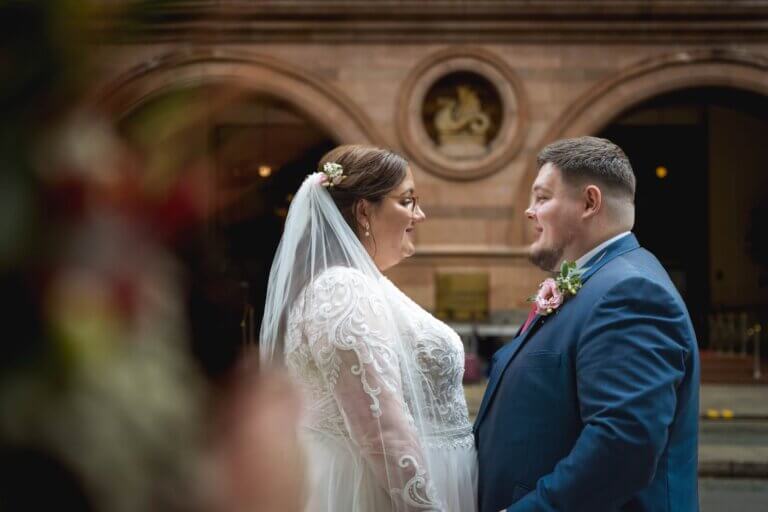
Before you can legally marry at a registry office, you must give notice at your local office, which costs around £35 each. To give notice, you must have lived within the local area for a minimum of seven days. To register, you must both visit the registry office in person with a valid ID. This must be done a minimum of 29 days before the date of your wedding and a maximum of 12 months before your wedding.
Giving notice doesn’t legally start the marriage process, or count as any kind of legal contract. It simply tells the registrar that you are who you say you are, and that you intend to get married to your partner.
When does a registry office wedding ceremony take place?
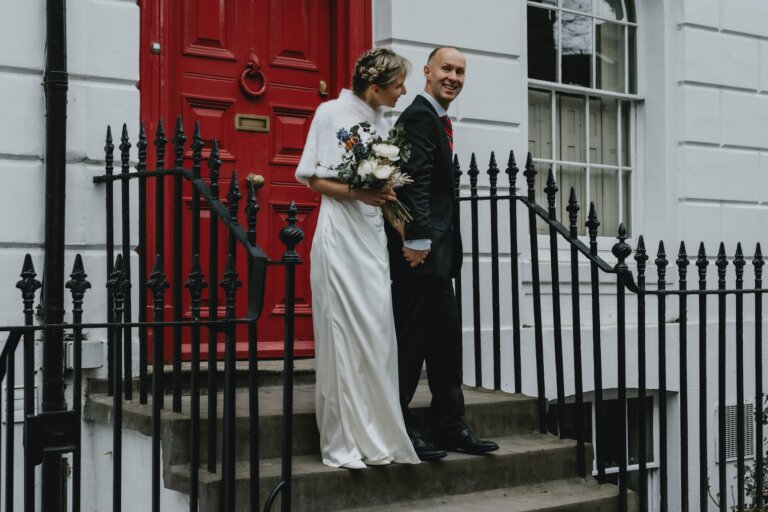
A registry office can host several weddings a day, and what time these are available depends on the local registry office and how many rooms and registrars there are. Sometimes, ceremonies will take place around lunchtime, but it’s more common for them to start in the early afternoon. Most registry office ceremonies will start on the hour.
You should also have your choice of days, with the majority of registry offices offering ceremonies seven days a week. However, with weekends being the most popular choice for couples, it can be more difficult to secure a weekend date, which is something to bear in mind if you’re looking to get married in the not-too-distant future.
For more information, our article on the best wedding day timeline outlines what happens and when on your wedding day.
Can you include a reading or hymn at a registry office wedding ceremony?
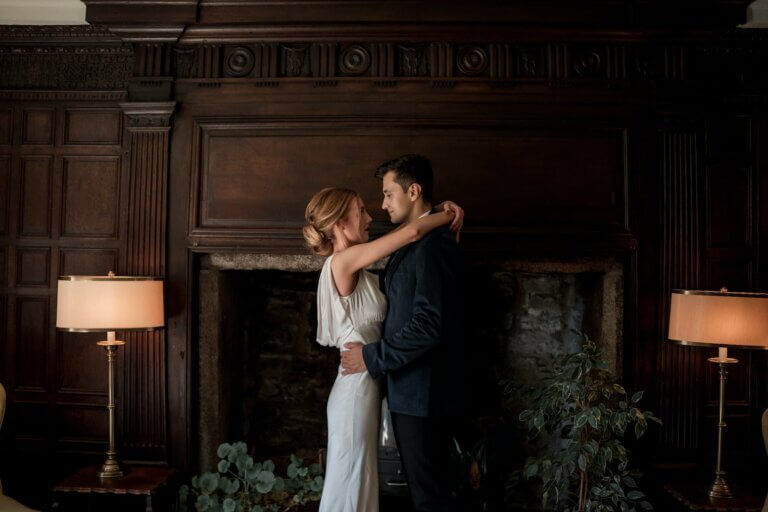
You can include readings or songs at your registry office ceremony, but they must not include any religious content. Many couples choose to ask a loved one to perform a reading, which might be a poem, extract or song lyrics. However, because most hymns sung at weddings are religious, it’s not common for there to be hymns at a registry office wedding.
Can you have a photographer at a registry office wedding?
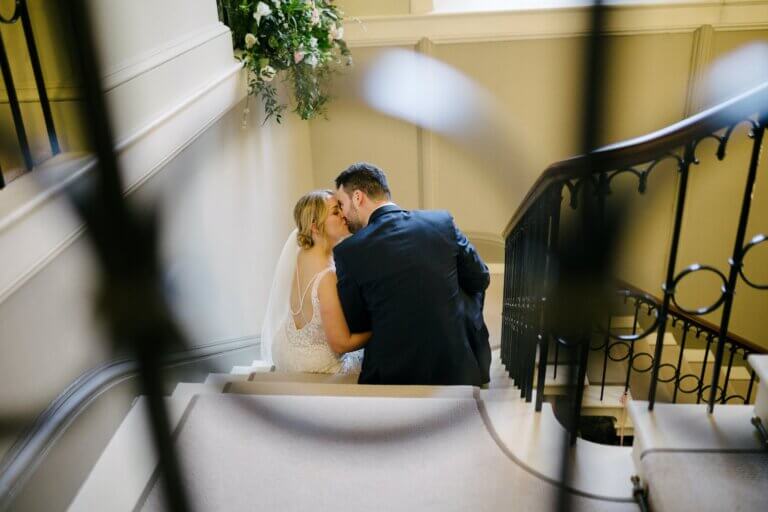
Yes, you absolutely can have a photographer at a registry office wedding. Because the ceremony is short, you should be able to secure decent rates for a professional photographer and pay way less than you might for a traditional wedding.
The only thing to note is that the photographer won’t be allowed to take photographs as you sign the register, but you can pose for photographs with the register afterward. If you plan on having the famous wedding confetti shot, make sure you check with the registrar first as there can be restrictions surrounding this.
What words are exchanged at a registry office wedding ceremony?
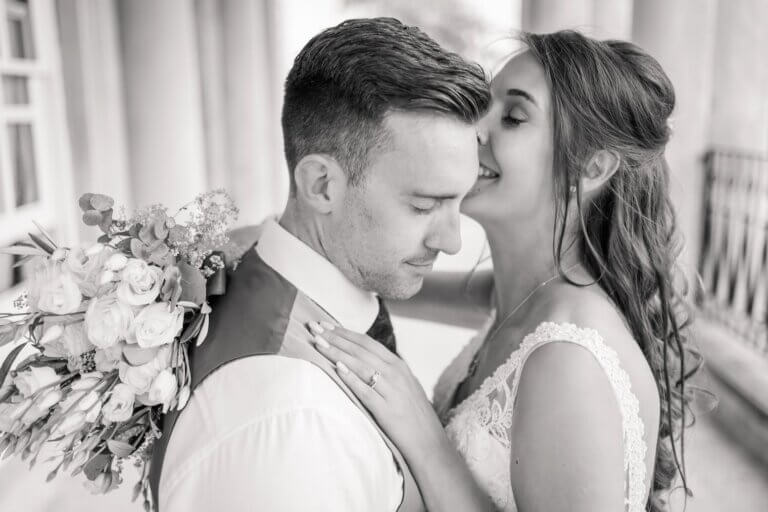
The words you speak at your wedding are hugely personal because it’s a promise and commitment to your partner about how you’re going to spend the rest of your life with them. This is why it’s important to think carefully about what you’d like to say at your wedding.
Thankfully, there’s a fair amount of flexibility offered when it comes to the words you can say at your wedding. You may wish to say the words fed to you by the officiant, but you can write your own vows if you’d like them to be more personal. However, it’s important to note that you’re unable to reference religion and the vows must be reviewed by the registrar before the ceremony.
As we’ve already highlighted, a registry office wedding is a short and legal process, so the majority of the words spoken by you (unless you choose otherwise) mainly cover this. This includes the declaratory and contracting words, which are the non-negotiable parts of what you’ll say. These words are usually as follows:
Declaratory words
“I do solemnly declare that I know not of any lawful reason why I [YOUR FULL NAME] may not be joined in matrimony to [YOUR PARTNER’S FULL NAME].”
Contracting words
“I call upon these persons here present to witness that I, [YOUR FULL NAME], do take thee [YOUR PARTNER’S FULL NAME] to be my lawful wedded [WIFE/HUSBAND/SPOUSE/PARTNER IN MARRIAGE].”
What traditions are there at a registry office wedding ceremony?
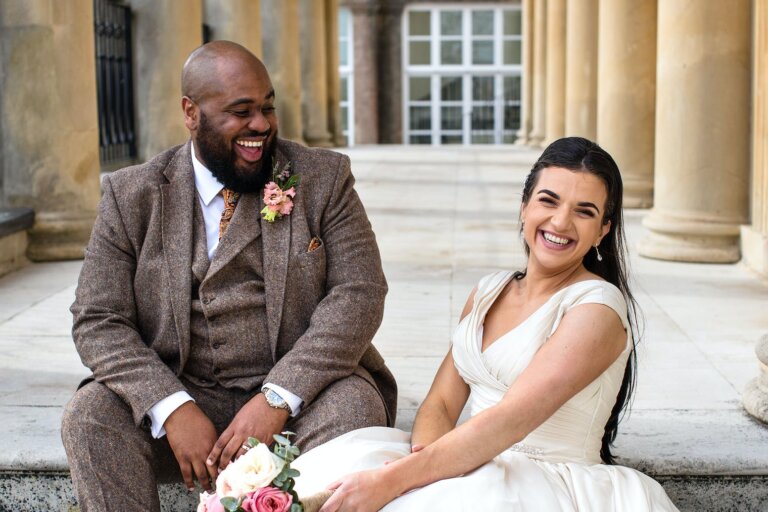
Because registry office weddings are usually on the shorter side, there aren’t as many traditions as there are at traditional or religious ceremonies. That being said, there are still some traditions, which are usually similar to that of a traditional ceremony. These include:
- The processional, when you walk down the aisle. However, because registry office weddings are much smaller than other wedding types, the processional is also much smaller.
- Wedding attire, such as the customary white dress or suit.
- The exchanging of the rings, which are traditionally held for safekeeping by the best man.
- Something old, something new, something borrowed, something blue.
- The confetti shot, which you will need to check with the registrar beforehand.
Which traditions you choose to uphold are down to you – it’s your wedding, after all. Only the parts of the ceremony that are legal have to be followed, so there’s usually a lot of wiggle room when it comes to everything else.
What do you wear at a registry office wedding?
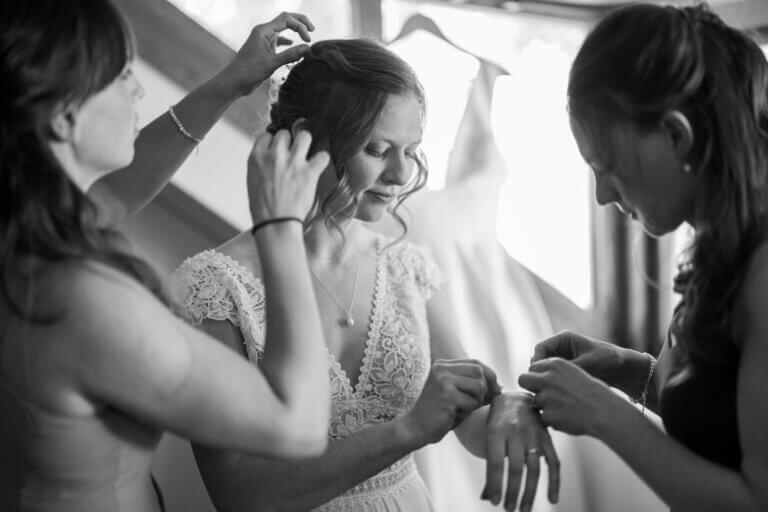
The great thing about a registry office wedding is that there aren’t as many expectations as there can be with traditional weddings. So, you’re free to wear whatever you like, whether it’s a white bridal dress, suit, formalwear, or something a lot more casual. Just remember to communicate with each other and let your guests know your plans.
What is the order at a registry office wedding ceremony?
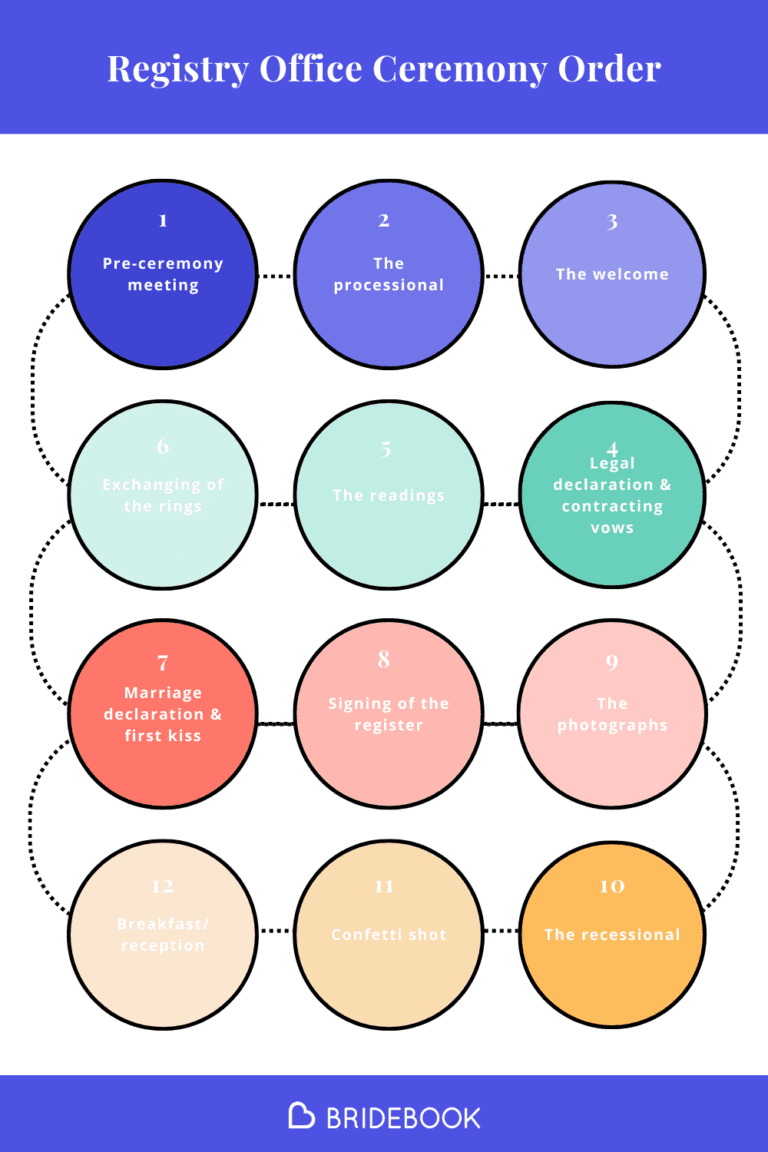
Because a registry office wedding is so short, there’s a lot to include in such a small amount of time. So, the order usually only includes the most ‘important’ and legal parts of a traditional wedding.
A registry office wedding ceremony will generally follow an order similar to the following (which doesn’t include the notice that must take place at least 29 days beforehand):
1. Pre-ceremony meeting
Before the ceremony can begin, you and your partner will meet with the registrar to make sure all the details are correct and you’re happy for the wedding to take place. You must both meet with the registrar, which can either be done separately or together.
2. The processional
Registry office ceremonies are often intimate, so the processional will be relatively short. That being said, you can include as many participants as you like, so if you’d like bridesmaids, groomsmen and even a page boy or flower girl, you absolutely can. The processional begins with the music of your choice playing (which can’t be religious in any way).
3. The welcome
Once you’re both at the front and your loved ones have taken their seats, the officiant will welcome everyone to the ceremony and say a few words about marriage and commitment.
4. The legal declaration and contracting vows
This is the legal part of the process, when you’ll repeat lines fed to you by the registrar.
5. The readings
Registry office ceremonies are short, but you’re still welcome to include a non-religious reading if you wish, which can be performed by the guest of your choosing (just make sure you ask them ahead of time).
6. The exchanging of the rings
The registrar will ask you (or your best man) for the rings. You’ll then exchange a few more words which the registrar can feed you, or you could read vows you’ve written yourself, as you give each other the rings.
7. The declaration of marriage and first kiss
Finally, the moment you’ve been waiting so long for – the registrar declares you married! You’ll also be invited to share your first kiss as your family and friends applaud (and shed a tear or two).
8. The signing of the register
You’ll be asked to sign the register to make your marriage legal and official, in the company of the two witnesses you’ll have asked ahead of the wedding. While this happens, music plays to entertain your guests (who will be all too happy to wait).
9. The photographs
The two of you are encouraged to pose for photographs with the marriage certificate, which can be official photographs if you’ve hired a photographer or your loved ones with their own cameras.
10. The recessional
The registrar will announce that the ceremony’s over and invite your guests to join you for the breakfast or reception (if you’ve chosen to have one at all). You’ll then leave the venue as music plays, and head outside for more photographs.
For more information on different orders, check out our guide to wedding ceremony orders.
How do you book a registry office wedding ceremony?
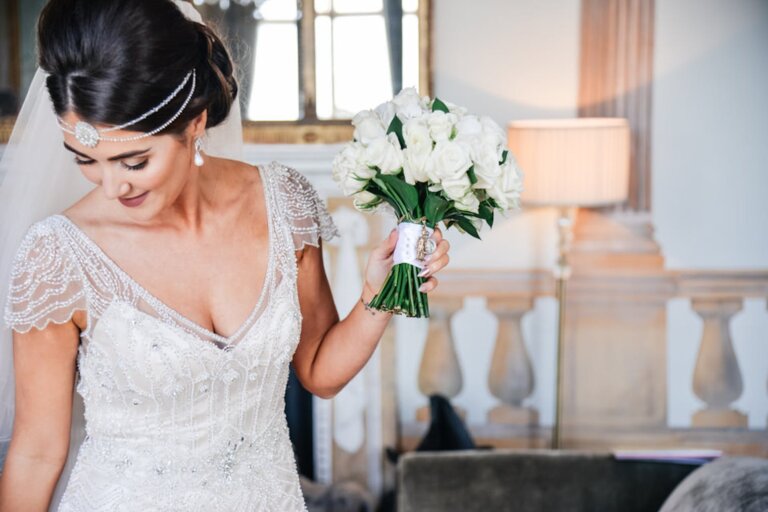
Booking a registry office wedding office is a relatively easy and straightforward process. First, you’ll need to call your local registry office and ask for an appointment to give notice. You must give notice at least 29 days before and within 12 months of the date you want to get married.
Once you’ve spoken to the registrar and given notice, you’re free to get married. Speak to the team at the registry office and book the date and time that suits you.
Who plans a registry office wedding ceremony?
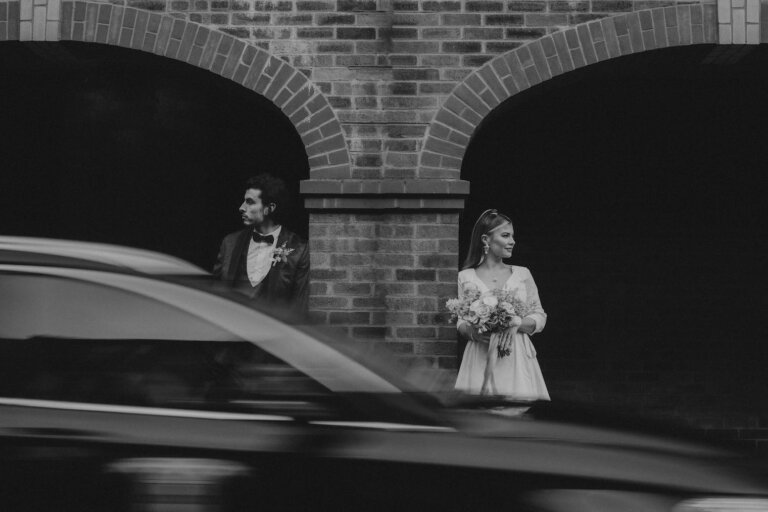
Because registry office weddings are often small in scale and more affordable than other types of weddings, it’s common for most couples to plan their ceremony themselves. You can hire a wedding planner if you wish, but the costs involved mean you’re not likely to experience much benefit. Plus, there are certain legal steps you have to do yourself, which means you’ll have to be fairly hands-on with the planning process.
What comes after a registry office wedding ceremony?

Once your registry office ceremony is over and you and your partner are legally married, what you do next is entirely up to you. If you have the budget and inclination, you might want to celebrate your marriage with a meal or party, or have a traditional wedding breakfast. It all depends on your personal preferences and budget.
Plan your wedding ceremony with Bridebook
Excited to plan your own registry office wedding ceremony? Sign up to Bridebook and get access to everything you need to plan your perfect wedding.
Browse other similar articles…
- The Ultimate Wedding Ceremony Guide
- The Ultimate Wedding Ceremony Order
- The Best Wedding Day Timeline
- How Long is a Wedding Ceremony?
Happy Planning!

